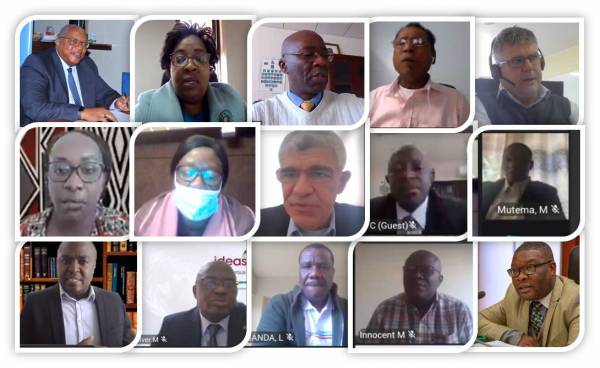|
Getting your Trinity Audio player ready...
|
The Economic Commission for Africa (ECA’s) is mooting the establishment of an agro-industrial park (AIP) for Zambia and Zimbabwe.
This emerged during the ECA Sub-Regional Office for Southern Africa’s virtual validation session for a study assessing the feasibility of establishing and managing a common Agro-Industrial Park (AIP) between the two countries held on Monday.
An Agro-Industrial Park is defined as “a geographic cluster of independent industries grouped together to gain economies of scale and positive externalities by sharing infrastructure – roads, power, communication, storage, packaging, by-product utilization, effluent treatment, logistics and transport, laboratory facilities, etc.”
While presenting the draft study, Rongai Chizema, ECA’s consultant for the study, said the bulk of Africa’s exports were dominated by semi-processed products which limits the continent’s influence on global markets, hence the need for structural transformation of agro-industrial processes on the continent.
“Agro-industry is an industry based on the processing of agricultural raw materials. Key in the context of developing economies – where agriculture remains an anchor sector. This agro-industrial park is envisaged to unlock idle capacity in the agriculture sector, enhance industrial capacity utilization, through agro-processing, and value chain development,” said Chizema.
Amongst others, Chizema said the objectives of the study were to assess the potential for the establishment of a common AIP between Zambia and Zimbabwe as well as enrich evidence-based industrial policy decisions to support accelerated industrialisation of Zambia and Zimbabwe, in line with the industrial strategies and action plans of both the Common Market for Eastern and Southern Africa (COMESA) and Southern Africa Development Community (SADC).
In his conclusion, Chizema said: “A compelling case exists for the development of a viable common agro-industrial park project that will leverage the comparative advantages of both Zambia and Zimbabwe for agro-led industrialisation to deliver mutually beneficial outcomes to the member states. The project is enhanced by the invaluable and immense availability of water and electricity infrastructure in the vicinity.
“[The] Project can accelerate progress towards sustainable and inclusive industrialization, including the attainment of Agendas 2030 and 2063. The common agro-industrial park can generate and capture industrialization opportunities in the agro-food value chain production systems, creating labor-intensive manufacturing jobs and moving towards higher-value activities.”
While discussing the draft study, Prof Owen Skae of Rhodes Business School, urged that the many risks associated with the agro-industrial park’s establishment could also hinder its successful take-off – such as the cost of doing business as well as the dynamics of public-private sector relations – be clearly articulated by the study.
“Is there a real intent to engage the private sector? The government ultimately has to set the enabling environment but it is the private sector that will take the lead in making sure things happen. When we talk about two countries collaborating, it is possible that the dynamics of public-private sector relations and trade policy issues can get in the way. So, what are the key assumptions and uncertainties?” he wondered.
Prof Skae, therefore, called for a proper stakeholder mapping and a strong public-private sector collaboration among all key players involved in the common AIP initiative across Zambia and Zimbabwe, so as to avoid a recent Nigerian situation where lack of exhaustive collaboration with key stakeholders before a USD450 million-worth Special Economic Zone (SEZ) project led to what he termed “a demise” of the investment.
Another discussant, Dave Chamroo, a trade and industry expert, described the common AIP between Zambia and Zimbabwe as a groundbreaking initiative adding that it was a clear departure from the previous practice of unilateral AIPs/SEZs by African countries.
“This joint initiative between two friendly governments who already boast similar collaborations in other sectors sets the scene for future collaborations like this. The question now is whether or not this agro-industrial project is meant to complement existing AIPs/SEZs in the respective countries or compete with them,” he asked.
Chamroo said the study offers legal and regulatory frameworks to govern the operations of the AIP such as the financial contributions of the two countries and revenue sharing formula, so as to avoid the pitfalls encountered by similar AIPs/SEZs across Africa, due to policy misalignment.
In his submission, Raymond Mari of the Gordon Business School urged Zambia and Zimbabwe to adopt Industry 4.0 in the design and management of the common AIP. Industry 4.0, he said, promotes convergence and interconnectedness between the biological (agricultural) and digital spheres as well as between different industries across different countries.
“How can the various players collaborate via an Industry 4.0-enabled operation? We are talking about national, regional, continental and global players. The customers of the agro-industrial park can come from across the continent and the globe hence the need for interconnectedness and interaction with the agro-park. At the same time, Industry 4.0 can facilitate access to raw materials and machinery by companies in the agro-processing value chain,” he averred.
Mari said since investment in Industry 4.0 was resource-intensive thus requires a lot of skillset and financial resources, Zambia and Zimbabwe should mobilize resources and collectively invest in it so as to reap its immense benefits. He believes Industry 4.0 would help optimize digital production capacity at the agro-park through data-driven operations as well as allowing for the integration of physical and software systems.
“Historically, Africa has been at the backdrop of adopting and following other continents. In this instance, particularly in the context of this agro-park, it would be the frontrunner in adopting Industry 4.0 and making it real, enjoying its benefits and setting the pace for the world,” he concluded.
Source: African Newspage






